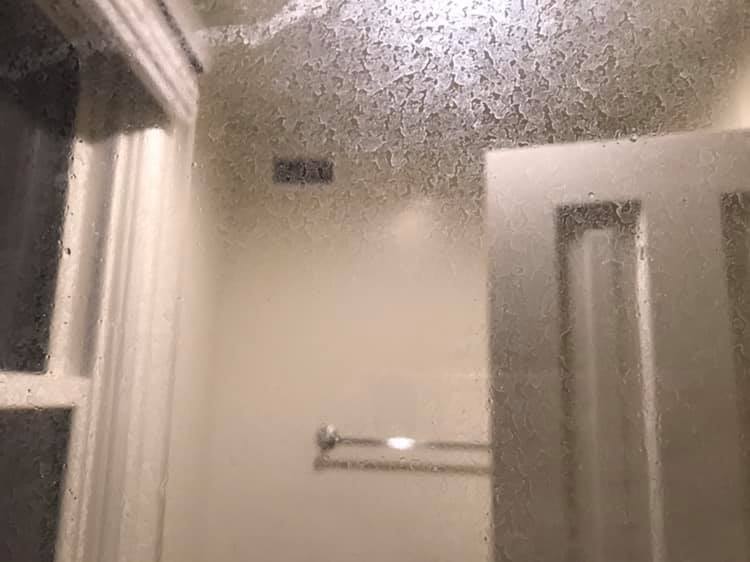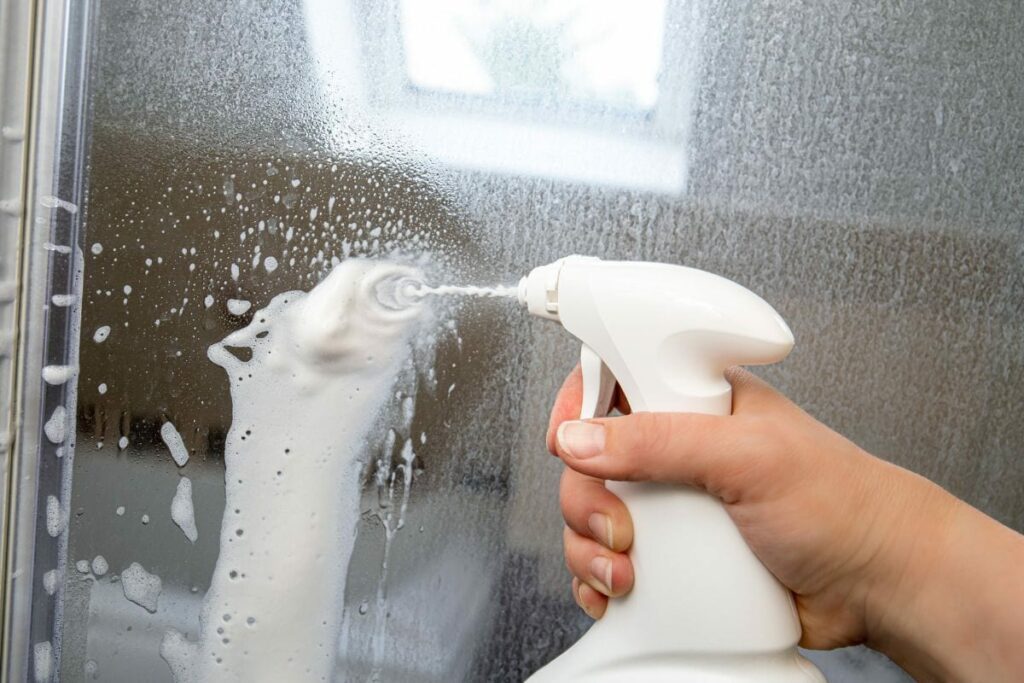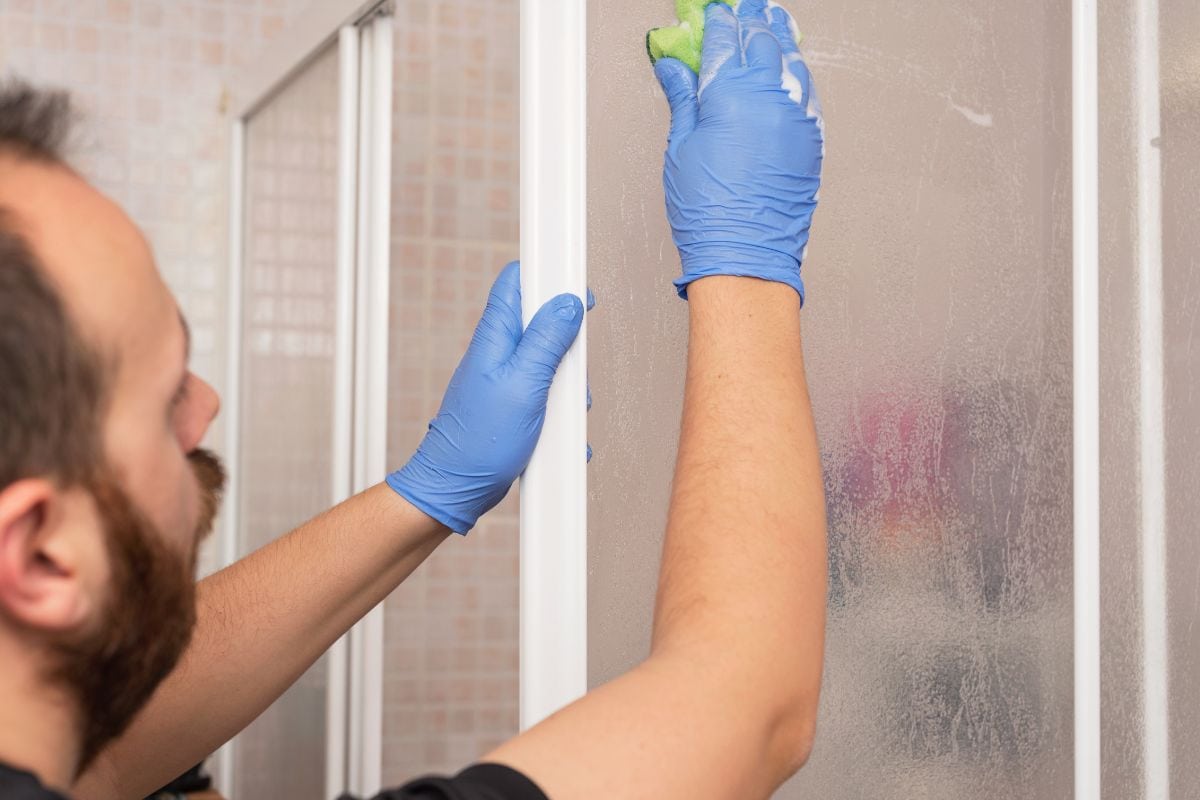Have you ever tried to remove stubborn water stains from your glass shower door using window cleaning products just to discover it is not doing the job? I have, and it left me feeling frustrated. So I set about learning what to do to fix the problem.
There are a few ways to remove hard water stains from shower doors. Less severe stains can be cleaned with household products. White vinegar works for light stains while heavier stains require vinegar combined with baking soda. A heavy buildup of limescale will need a commercial acid-based cleaner.
Let’s get to know exactly what hard water stains look like as well as the most effective methods for dealing with them once and for all.
The Different Ways Of Removing Water Stains
If you have noticed the buildup of hard water stains on your shower door the good news is that it is possible to remove them. Just be sure that you don’t delay the process for too long.
Because hard water stains consist of calcium carbonate, they can be broken down by acid. Mild stains require mild acid while heavy buildup needs a strong acid to break them down.
Fresh, light stains can be removed by using a 50/50 mixture of white vinegar and water. Heavier stains that are resistant to the 50/50 mixture will likely need full-strength vinegar together with a baking soda scrub.
When there is a heavy limescale buildup your only remedy will likely be a commercial acid-based cleaning product such as bleach or a dedicated limescale remover.
What Does Hard Water Limescale Look Like In The Shower?

Limescale is the chalky white deposit that stays on your shower door after the water splashes have evaporated. Limescale is calcium carbonate, the same compound that you find in blackboard chalk.
If like me, you also live in an area with hard water, you will most likely find limescale buildup on your shower doors. Hard water sometimes also contains other minerals, but calcium carbonate will be the most prevalent.
The way limescale forms on your shower door is due to crystalization. The calcium carbonate is dissolved in the water. As the water evaporates the concentration level of calcium carbonate increases to the point where minute crystals form on your shower door.
If left untreated, these tiny calcium carbonate crystals give an ideal surface to catch water during your next shower and the crystals slowly grow bigger to the point where you start seeing the white buildup.
How To Remove Lighter Water Stains

By far the easiest way to remove lighter water stains is with white vinegar. Mix a 50/50 solution of white vinegar and water in a spray bottle. White vinegar is a natural acid that is able to chemically break down the calcium carbonate crystals in your hard water stains.
Spray the solution onto the affected surfaces of your shower door. Let the solution sit for at least 15 minutes so that the vinegar can break down the crystals, then wipe clean.
Are Hard Water Stains Permanent
If you leave hard water stains for too long the calcium carbonate crystals will grow and compact into limestone. This is the same kind of lime flowstone that you find in limestone caves. At this point, your hard water stains are considered permanent
If you leave your hard water stains until the manageable crystals become hard limestone then you are unlikely to be able to remove the hard water stains without causing damage to your shower door.
How To Remove Stubborn Water Stains
If you have left your hard water stains unattended for too long they become too stubborn to be removed using the 50/50 vinegar-water cleaning solution. These tougher stains need a tougher solution.
When you have hard water stains that don’t respond to the diluted white vinegar solution, you will need to use a combination of undiluted white vinegar and some scrubbing with baking soda.
Thoroughly wet the hard water stain with full-strength vinegar and let it soak for 30 minutes. If I notice that the vinegar is drying out, I’ll spray on some more before the 30 minutes is over. You want to have the vinegar soaking into the stain for 30 minutes.
Shortly before the end of the 30 minutes, mix up a thick cleaning paste of baking soda and water. Grab an old toothbrush and scrub the stains with the cleaning paste in a circular motion.
Removing Stains With Chemical Cleaners

While home remedies might solve hard water stains, commercial chemical cleaners work much faster.
If you have really deep-set hard water stains then a specific mineral-removing solution will be the best choice as long as you don’t have an aversion to using a chemical cleaner. Be sure to follow the safety instructions of whatever product you choose and wear the correct protective clothing.
When it comes to chemical cleaners for removing hard water stains, I get the best results from using Bioclean Hard Water Stain Remover.
How To Prevent Hard Water Stains
It is far easier to prevent hard water stains from forming than it is to clean them once they are there, especially if you leave them long enough to become stubborn.
I keep a soft cloth in my bathroom and I quickly wipe down the shower door and tiles in my shower every time I take a shower.
Wiping away the excess water prevents it from drying on the surfaces of my shower and leaving any chalky hard water stains.
Is A Water Softener The Solution To Hard Water?
If you hate the idea of wiping down your shower after you have used it or scrubbing away your stubborn hard water stains, there is an alternative solution.
You can have a water softener installed on the water supply for your entire home. This will get rid of the problem at its source by stripping the calcium carbonate and other minerals from the water.
A water softener system is something that will need professional installation, which makes it more costly than wiping down a shower door after use.
How Do Water Softeners Help To Soften Hard Water?
In general, water softeners work with salt as a way to filter the calcium and magnesium minerals from the water. However, you will need to replenish the salt in the filtration system regularly, so this is not a maintenance-free solution.

Amos Christen graduated with a bachelor’s degree in Interior Design from Drexel University — Philadelphia, PA. Since 2003, Amos has worked with top interior design professionals in this area, including architects and interior/graphic/lighting designers. As a skilled interior designer, Amos Christen is highly versed in fine arts and crafts and uses that to supplement his main area of expertise. He often publishes articles related to home décor on several websites, including Sprucetoilets.com, Sprucebathroom.com, and Mybesuitedhome.com. He also contributes to leading interior design magazines.
